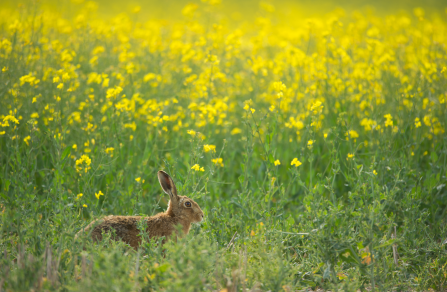Catchment Sensitive Farming
We are giving valuable environmental advice and support to farmers, and have helped 80 farmers to access grant aid packages, which have contributed more than £7 million to the Island’s rural economy.
Together we're improving the Island’s countryside for wildlife and future management of our natural resources in the light of climate change, water poverty and food production.
Improvements on the ground for wildlife
We work with farmers to create space for wildlife on their land. This might include a network of buffer strips and hedgerows with field corners, wild bird seed mixes and pollen and nectar sources. These options provide a range of habitat for farmland birds, mammals such as brown hare and invertebrates. They also provide opportunities for less common arable plants to thrive.
We then talk with their neighbours, creating change across the landscape. Wetland habitats along the watercourses get connected to the rolling chalk downland and soon we have wide areas for wildlife, from the estuaries and lowland meadows in the north to the arable land and sandy cliffs and chines in the south.
Species that benefit from this work include water vole, red squirrel, common dormouse, chalkhill blue, Adonis blue, skylark and common snipe.

© Andrew Parkinson 2020VISION
Project achievements
Since the start of this project we’ve conducted 212 visits to 102 farms and given advice on a variety of issues from the reduction of chemical pollution to protecting watercourses and creating new wildlife habitats.
Recently we secured a Capital Grants Fund and a Natura 2000 fund to help farmers improve the condition of their farmyards, tracks and fencing so they can continue to meet the challenges of farming in the 21st century, and protect European sites of high nature conservation value.
Project partners
The Environment Agency and Natural England have helped us talk to farmers about the management of land for sustainable environmentally-friendly farming.
